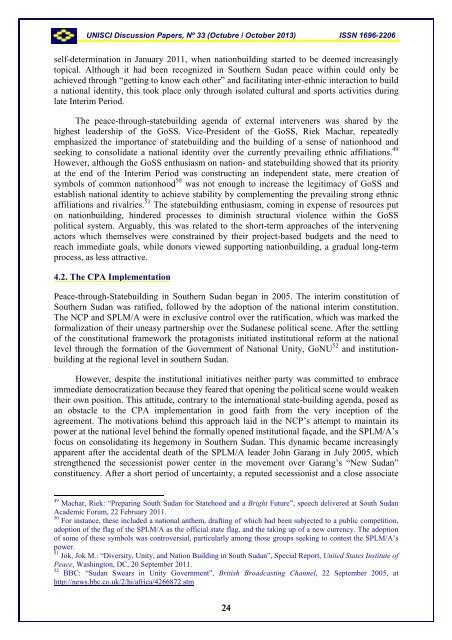UNISCI - Universidad Complutense de Madrid
UNISCI - Universidad Complutense de Madrid
UNISCI - Universidad Complutense de Madrid
You also want an ePaper? Increase the reach of your titles
YUMPU automatically turns print PDFs into web optimized ePapers that Google loves.
<strong>UNISCI</strong> Discussion Papers, Nº 33 (Octubre / October 2013) ISSN 1696-2206self-<strong>de</strong>termination in January 2011, when nationbuilding started to be <strong>de</strong>emed increasinglytopical. Although it had been recognized in Southern Sudan peace within could only beachieved through “getting to know each other” and facilitating inter-ethnic interaction to builda national i<strong>de</strong>ntity, this took place only through isolated cultural and sports activities duringlate Interim Period.The peace-through-statebuilding agenda of external interveners was shared by thehighest lea<strong>de</strong>rship of the GoSS. Vice-Presi<strong>de</strong>nt of the GoSS, Riek Machar, repeatedlyemphasized the importance of statebuilding and the building of a sense of nationhood andseeking to consolidate a national i<strong>de</strong>ntity over the currently prevailing ethnic affiliations. 49However, although the GoSS enthusiasm on nation- and statebuilding showed that its priorityat the end of the Interim Period was constructing an in<strong>de</strong>pen<strong>de</strong>nt state, mere creation ofsymbols of common nationhood 50 was not enough to increase the legitimacy of GoSS an<strong>de</strong>stablish national i<strong>de</strong>ntity to achieve stability by complementing the prevailing strong ethnicaffiliations and rivalries. 51 The statebuilding enthusiasm, coming in expense of resources puton nationbuilding, hin<strong>de</strong>red processes to diminish structural violence within the GoSSpolitical system. Arguably, this was related to the short-term approaches of the interveningactors which themselves were constrained by their project-based budgets and the need toreach immediate goals, while donors viewed supporting nationbuilding, a gradual long-termprocess, as less attractive.4.2. The CPA ImplementationPeace-through-Statebuilding in Southern Sudan began in 2005. The interim constitution ofSouthern Sudan was ratified, followed by the adoption of the national interim constitution.The NCP and SPLM/A were in exclusive control over the ratification, which was marked theformalization of their uneasy partnership over the Sudanese political scene. After the settlingof the constitutional framework the protagonists initiated institutional reform at the nationallevel through the formation of the Government of National Unity, GoNU 52 and institutionbuildingat the regional level in southern Sudan.However, <strong>de</strong>spite the institutional initiatives neither party was committed to embraceimmediate <strong>de</strong>mocratization because they feared that opening the political scene would weakentheir own position. This attitu<strong>de</strong>, contrary to the international state-building agenda, posed asan obstacle to the CPA implementation in good faith from the very inception of theagreement. The motivations behind this approach laid in the NCP’s attempt to maintain itspower at the national level behind the formally opened institutional faça<strong>de</strong>, and the SPLM/A’sfocus on consolidating its hegemony in Southern Sudan. This dynamic became increasinglyapparent after the acci<strong>de</strong>ntal <strong>de</strong>ath of the SPLM/A lea<strong>de</strong>r John Garang in July 2005, whichstrengthened the secessionist power center in the movement over Garang’s “New Sudan”constituency. After a short period of uncertainty, a reputed secessionist and a close associate49 Machar, Riek: “Preparing South Sudan for Statehood and a Bright Future”, speech <strong>de</strong>livered at South SudanAca<strong>de</strong>mic Forum, 22 February 2011.50 For instance, these inclu<strong>de</strong>d a national anthem, drafting of which had been subjected to a public competition,adoption of the flag of the SPLM/A as the official state flag, and the taking up of a new currency. The adoptionof some of these symbols was controversial, particularly among those groups seeking to contest the SPLM/A’spower.51 Jok, Jok M.: “Diversity, Unity, and Nation Building in South Sudan”, Special Report, United States Institute ofPeace, Washington, DC, 20 September 2011.52 BBC: “Sudan Swears in Unity Government”, British Broadcasting Channel, 22 September 2005, athttp://news.bbc.co.uk/2/hi/africa/4266872.stm24
















